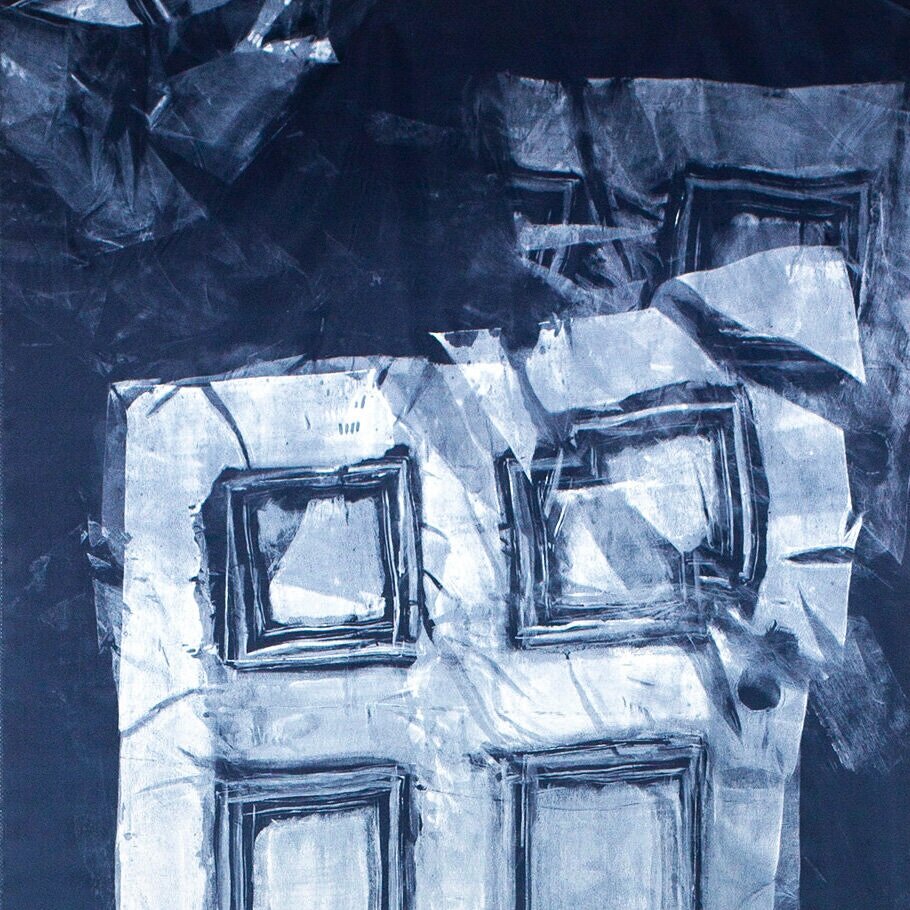STOPPING TIME: Material Prints from 3000 BCE to Now
Curated Touring Exhibition. THE GRAFTON REGIONAL ART GALLERY, NSW (8 October - 5 December 2021)/ LOGAN REGIONAL ART GALLERY, QLD (23 October – 28 November 2020)/ NEWCASTLE REGIONAL ART GALLERY, NSW (29 February - 10 May 2020), GYMPIE REGIONAL ART GALLERY, QLD (25 September – 16 November 2019).
Stopping Time: Material Prints 3000 BCE to Now is curated by Ross Woodrow with assistance from Ali Bezer and Blair Coffey. It should also be acknowledged that these artists are involved in the exhibition and have made significant input into the project, community outreach, and catalog writing - as have the staff in the exhibiting galleries at Gympie, Newcastle, and Logan - who made important contributions to the shape of the exhibition.
Installation Views
Installation view "Fractured Door" (2019), Gympie Regional Art Gallery, 2019.
Installation view "Fractured Door" (2019), Gympie Regional Art Gallery 2019.
Installation view "Fractured Door" (2019), Newcastle Art Gallery, 2020.
Installation view "Fracture Door" (2019) Newcastle Art Gallery, 2020.
Installation view "Fractured Door" (2019), Logan Region alArt Gallery, 2020.
Installation view "Fractured Door" (2019) Logan Regional Art Gallery, 2020.
Installation view "Fractured Door" (2019), Grafton Regional Art Gallery, 2021.
Installation view Grafton Regional Art Gallery, 2021
Installation view "Fractured Door" (2019), Grafton Regional Art Gallery, 2021.
Installation view Grafton Regional Art Gallery, 2021.
Installation view "Shroud Door", 2019, Newcastle Regional Art Gallery, 2020.
Installation view featuring "Drapery #1" (2019) and "Held in Place" (corner work" (2019), Logan Regional Art Gallery, 2019.
Installation view featuring "Drapery #1", 2019, Logan Regional Art Gallery, 2020.
Installation view Grafton Regional Art gallery, 2021.
Installation view Grafton Regional Art gallery, 2021.
Exhibition Statement
Material prints are images or objects that have been created from a matrix by mechanical, chemical, or electronic means and can be experienced as physical or material artifacts. The strategic inclusiveness of this broad definition positions traditional prints on paper as part of a much larger constellation of printed images that extends well beyond the usual point of origin for printmaking in the fifteenth century, when Gutenberg invented movable type. It also extends into the present, beyond the perceived terminating decline with the development of digital photography at the end of the twentieth century. Not unexpectedly, works on paper make up the vast bulk of the material in the exhibition since, as with any touring exhibition, logistical limitations amplify when the works in the exhibition reach across media divisions and into deep time. These difficulties partly explain the regretful omission of photography as a major presence in the exhibition. Nonetheless, the Museum of Modern Art in New York, with its infinite resources, has already mounted a massive survey of photography titled The Printed Picture, curated by Richard Benson, which presented a seamless lineage from fifteenth-century woodcuts to printed barcodes with a focus on material prints and an examination of the processes by which they were printed. Incidentally, this 2008 exhibition also demonstrated that the differences between chemical and digital processes in photography are essentially semantic distinctions.
It is not only the expanded definition of printmaking that differentiates Stopping Time: Material Prints from 3000 BCE to Now from any other print exhibition yet mounted in Australia. The exhibition adopts a heterochronic view of time by bringing works together in thematic clusters, regardless of the period or place of production, collapsing temporal distance between them, and emphasizing the dual power of material prints to embed or carry past time and to also stop time during our aesthetic engagement with them. This timeless encounter with material prints might be described as aesthetic time (see, Keith Moxey Visual Time: The Image in History) yet when artists attempt the synthetic transfer of ideas into matter and image it is more a process of collective cultural imagining and technological revelation rather than aestheticism. This can be framed as anachronic time in the sense of no time (timeless) in that the material image carries its own time as I argue in the catalog. The full range of printmaking practices is represented, from ancient Mesopotamian images pressed in clay from cylinder seals to 3-D printed contemporary works. It includes works from the Griffith University Art Museum, the Newcastle Art Gallery along with several private collections, and the addition of recent work by contemporary artists including Ali Bezer - Blair Coffey - Tim Mosely - Ryan Presley - Pamela See.
-Ross Woodrow, Exhibition Blurb, 2019. Featured Artworks
Ali Bezer "Fractured Door," 2019. Monoprinted door in white relief ink on Indigo blue acetate silk fabric, 3.5 meters height.
Ali Bezer Shroud# 1, 2019. Monoprinted door (front) on rice paper.
Ali Bezer "Fractured Door," detail.
Ali Bezer "Held in Place "(variation #1), 2019. Unique State print installation created on corner wall with a monoprinted sky background, steel wire as a tightrope and magnets representing the high-wire walker Philipe Petit.
Ali Bezer "Held in Place "(variation #1) detail.
Ali Bezer Shroud# 12 2019. Monoprinted door (front) on muslin cloth.
Ali Bezer "Drapery #2" 2019. Unique state mono-print muslin cloth in gradient colour on Magnani off-white paper.
Ali Bezer "Drapery #1" 2019. Unique state mono-print muslin cloth in gradient colour on Magnani off-white paper.
Ali Bezer "Drapery #1" detail.
Ali Bezer "Drapery #2" detail.


























